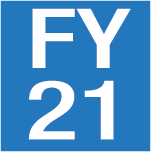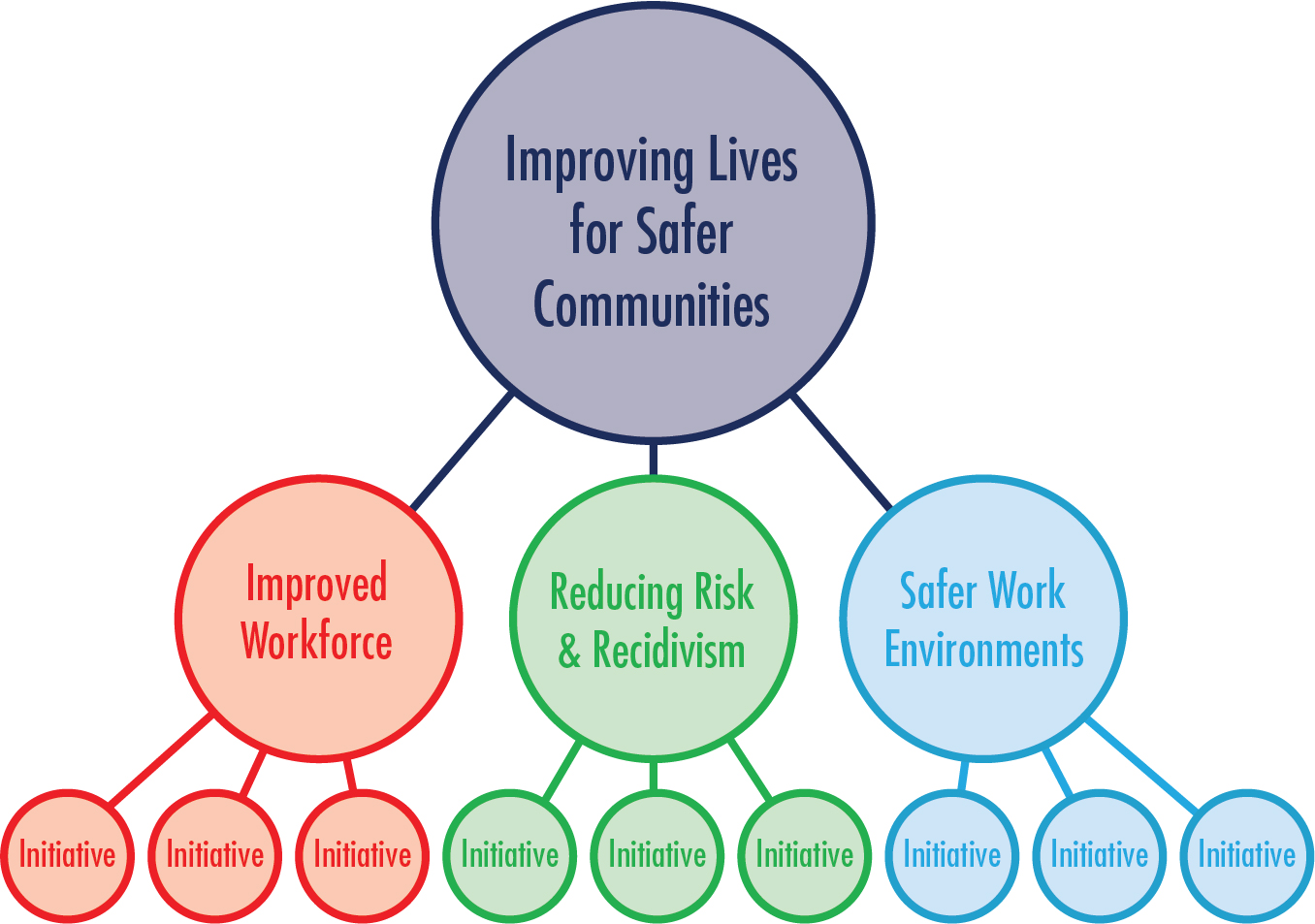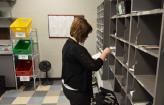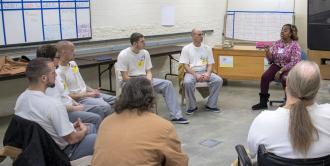FY21 Strategic Initiatives
Our mission in the Missouri Department of Corrections is to improve lives for safer communities.
Our strategic plan serves as a road map to guide us in that mission. Strategic initiatives — the actions we take to achieve our goals — support three major themes:
- Creating a safer work environment
- Developing our workforce
- Reducing risk and recidivism
Safer Work Environments
Conduct Staffing Pattern & Shift Analysis
We are analyzing work patterns at our facilities to determine the appropriate number of staff needed to ensure safe, secure and effective operation of our facilities. The products of this initiative include a shift relief factor (SRF) that is current; identification of appropriate post reflecting each facility's mission; appropriate staffing levels; and alternate shift recommendations to accommodate staff and operational needs.
Implement New Offender Censorship Procedures
The items that enter institutions have an impact on daily operations and affect the safety and security of each site. New technologies make it easier for inappropriate or unapproved materials to enter in ever-evolving ways. To meet the need to manage banned materials, this initiative aims to incorporate technologies that better screen for unapproved items so we can enhance the safety of institutions — while simultaneously complying with rules and regulations that allow offenders access to mail and legal services.
Redesign the Offender Mail Policy and Procedures
Drugs and other contraband substances delivered through postal mail can threaten the health and safety of offenders and staff within our institutions. This initiative aims to create consistent and efficient mail processes throughout the institution that reduce the potential for staff exposure to dangerous substances and yet continue to provide access to personal and legal correspondence between offenders and significant parties in their lives.
Implement Automated Staff Time Keeping in Division of Adult Institutions
Site safety is enhanced is when managers are able to adequately monitor the work environment. Knowing who is in a worksite is key to safety and security, as well as ensuring staff are at their assigned posts at their assigned times. Installing an automated time-keeping system for tracking staff shifts makes this process easier and improves safety and security within our institutions. These changes can help us make sure our facilities and offices are properly staffed and reduce unnecessary personnel expenses.
Develop Process for Identification & Tracking of Security Threat Groups
Tracking and monitoring of security threat groups (STG) and their activity helps the department take a proactive stance to situations that may pose a risk at the worksite. This initiative also enhances the safety and security of the general public, by developing a portal for related information that is shared with law enforcement agencies, making both our communities and our facilities safer places to live and work.
Improve Safety at Regional Offices/Training Centers and Central Office
Corrections can be a risky business, and we want all team members to feel safe when they come to work. This initiative reviews our work environments from a staff safety point of view. We plan to improve safety at regional offices, training centers and Central Office with new equipment and development of safety plans.
Launch Offender Suicide Prevention Program
Suicide risk is an ever-present concern with constant assessment needed to effectively determine each offender’s risk for taking his or her own live. This initiative aims to improve upon intervention strategies implemented in corrections facilities.
Transition to Electronic Files to Support Remote Work as a Viable COVID-19 Viral Containment Strategy
Onset of the COVID-19 pandemic and efforts to mitigate the impact of the virus inspired the department to develop alternative ways for many staff to complete work while staying safe. One strategy identified is a move toward creating electronic files for commonly used hard-copy information and documents. This initiative aims to identify the scope of hard copy utilization within the department and develop a plan to make files more accessible to alternative work locations.
Continue Systematic and Comprehensive COVID-19 Testing at MODOC Institutions to Support Safe Reopening Strategy
To support the safe re-opening of Missouri and allow greater interaction for offenders, when feasible, we aim to conduct systematic and purposeful testing for COVID-19 at our institutions. Testing helps us identify areas where infection has occurred and implement our containment strategies with the least amount of disruption to normal operations.
Improving the Workforce
Develop a Learning Management System to Support Digital Training Within COVID-19 Viral Containment
Even as we are forced to reduce contact among individuals to lower the risk of COVID-19 spread, running our institutions and carrying out our public safety missions require specialized training and a method to exchange and further our knowledge. This initiative aims to develop a system to manage training and other required educational tasks in a virtual environment that allows staff to maintain and improve skills will reducing risk and complying with safety guidelines.
Begin Onboarding Process for Supervisory Staff
Supervisory staff play a key role in supporting a culture we can be proud of. This project aims to develop an onboarding process for employees promoted or hired into supervisory positions. We want to ensure people moving into these positions are properly supported with skills and information they need to successfully supervise others in a positive and productive manner.
Begin Onboarding Process for Frontline Staff
Research shows higher retention rates are achieved by companies who have an onboarding process for their employees. This project aims to develop a structure that helps to integrate new hires into the culture of the department and supports success in their day-to-day jobs. The process supports understanding how each person's work contributes to the overall mission and success of the department.
Create Employee Wellness Program
We want our employees to be productive and healthy. An update of our employee wellness program helps to foster healthy behaviors for all team members. The program supports staff working in jobs that traditionally can be highly stressful along both physical and mental domains.
Implement Core Correction Officer I Competencies
Matching employee abilities to job requirements is an important principle of evidence-based practice in corrections. When we know the core competencies of a position and hire based on the applicants' ability to demonstrate those skills, we ensure quality in our hiring practices and increase the chance that staff are happy and satisfied in their role. This initiative establishes core competencies and a process to ensure prospective staff understand the expectations of the role.
Provide “The Corrections Way” Training to all Staff
We want all staff to fully understand the culture of the department and help them to be successful in their day-to-day jobs. The project aims to train all frontline and new staff in “The Corrections Way,” our customized training model that prepares and equips staff to identify, teach, demonstrate and reinforce critical skills that cultivate a positive, productive, safe work environment. Our culture demands we help all teammates see how their work contributes to the overall mission and success of the department.
Complete Missouri Corrections Integrated System (MOCIS)
Automation is a high priority of the department. It makes everyone’s job easier and gives staff the ability to view and share key information with one another throughout the state. This initiative updates the department’s offender management and tracking system and integrates additional informational modules that help staff to be more effective and efficient at their jobs.
Transform the Department Training and Staff Development Academy
Adequate and applicable training drives staff to become experts in our field and to feel fulfilled in the role they play. This initiative aims to develop a training academy that leads the Department of Corrections into the 21st century with services that are demonstrably effective for all staff and responsive to the needs and mission of the department. Through this transformation, the MODOC Training Academy develop curricula that reflect the mission, vision, values of the department and foster staff success.
Repurpose the “Citizen’s Advisory Committee on Corrections” (CAC)
We value transparency in all our operations and particularly in our goal to redirect resident behavior in a positive manner. The purpose of the Citizens' Advisory Committee is to expand positive interaction between the department and those in our care and to provide oversight to the offender grievance process. This initiative aims to repurpose the committee and offer a more relevant review of current grievance responses to offenders and provide a more global evaluation of department-wide data to identify relevant trends and issues.
Redevelop the Staff Website
Giving staff timely access to current information and relevant tools is essential to our success. We aim to support staff-focused department goals such as more effective onboarding, improved staff retention and ongoing operational excellence by creating a user-centered website experience for our teams. We want to ensure every staff member at every point in their career has quick and easy access to the tools and information they need to do their jobs effectively. Replacing the largely static current intranet site, the new site will guide all members of the corrections team through training; policies, procedures and forms; department computer applications and systems; news and announcements; employee wellness; human resources; and everything else they need to do their jobs effectively and happily.
Adopt a Trauma-Informed Culture at Female Institutions
We most efficiently progress toward our mission when we understand the underlying reasons Missourians come under the care of the department. Research consistently shows that the vast majority of women in our prisons have experienced significant and life- altering traumatic situations. This initiative aims to expand the work we do at our women's institutions from a trauma-aware culture to a trauma-informed culture. This effort makes it easier to manage behavior within our institutions and increases our chances of helping people understand and change decisions and behavior that lead to criminal justice involvement.
Reducing Risk & Recidivism
Expand Ashland University Education Program
We believe providing opportunities for pro-social activities like obtaining a college degree improves the lives of residents and supports economic growth for Missouri. This initiative aims to expand higher-education opportunities to all institutions for staff and offenders at reduced and/or free cost. Through this program we improve our workforce and support successful reentry for offenders.
Restructure Institutional Programming and Activities to Conform with Evidence-Based Practice
Research shows that correctional interventions can reduce the chance of future criminal justice system involvement. We aim to provide programs and activities to residents that are proven to improve successful reintegration into society by former offenders. This initiative aims to review all programming offered at our prisons and increase the use of research-based, practice-centric curricula in programs provided within the Division of Adult Institutions.
Develop Integrated Mental Health and Substance Use Treatment Philosophy and Standards
Many people in our prisons have both mental health and substance use disorders. We hope to improve outcomes and support recovery for residents affected by these issues.This initiative is designed to develop consistent, coordinated and holistic behavioral health treatment in all department facilities, with a focus on peer-facilitated programming and core risk-reducing programming.
Launch Community Peer Specialist Program
People involved in the criminal justice system often need additional support integrating into society after leaving prison or while under supervision in the community. Peer support programs are one way to provide needed assistance and to provide currently incarcerated offenders a meaningful way to contribute to society and a viable career after prison. This initiative aims to explore successful peer-focused models and develop recommendations for adopting similar programs within MODOC.
Design Program Model for Court Referred Short-term Offenders
We operate institutional treatment centers across the state for people sanctioned by the court to short-term imprisonment. This initiative reviews current practices at these centers and aims to align treatment with best practice and eliminate processes that delay or reduce available treatment time. We aim to increase the efficacy of the program and increase success of participants once released to the community.
Fortify Quality Control and Quality Assurance Support for Correctional Programming
To be most effective at reducing future negative behavior, correctional programs must be delivered consistently and with fidelity to the intervention model. This initiative aims to provide a structure for evaluation that supports ongoing review of programs and technical assistance for class facilitators. By ensuring correctional interventions are provided as intended, the department is able to realize a return on investment by reducing future stays in prison.
Open Offender Nursing Home
The Department of Corrections releases offenders who are difficult to place in the community as a result of their complex medical/mental health conditions and criminal histories. Most of these offenders have no family, support system, or plan for care or housing. The department is working with an outside partner to establish a nursing and intermediate care facility that will specialize in caring for individuals upon their release from prison or for placement through probation in lieu of a prison.
Recreate Parole Release Guidelines
A renewed focus on ensuring we are using best practices and risk-based assessment is helping to drive our decisions. We are working with national experts to refine release guidelines and support readiness-based prison release decisions. This initiative aims to develop decision-making tools that are in line with evidence-based practices and that provide a structured behavioral focus to support release deliberations.
Detailed strategic initiative information is available to staff on the K drive.














